Iranian Officials Stress They Won’t Back Down On Hijab
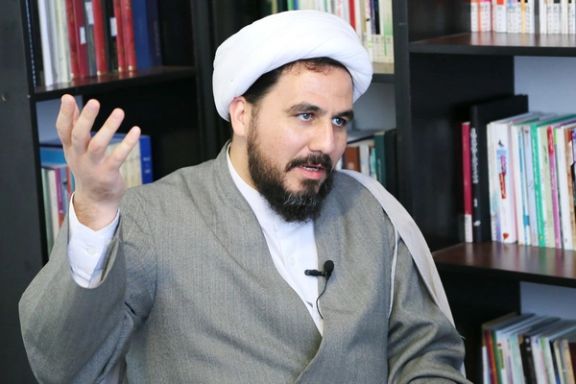
An Iranian official says the issue of obeying mandatory hijab is a matter of principle that the Islamic Republic cannot disregard as it is part of the Iranian “civilization”.

An Iranian official says the issue of obeying mandatory hijab is a matter of principle that the Islamic Republic cannot disregard as it is part of the Iranian “civilization”.
Mehdi Bayati, the secretary of the government’s “Virtuous Life” working group, said Monday that God has made hijab mandatory for Muslims according to Quran, although this has long been a matter of debate.
He further added that hijab is a must because of its social and political impact on strengthening Islam. Iranian officials use the term ‘hijab’ as an equivalent to the veil or headscarf, but according to scholars this is not the case. In the context of its usage in the Quran, ‘Hijab’ refers to a ‘curtain or barrier’. It is used in the Quran multiple times but not in the sense that is prevalent among the people today.
This comes as some pundits say the reason why Iranian women burned their headscarves during the recent protests is that the government tried to impose a certain dress code on them in the name of religion.
Last week, Iran Police Chief Ahmadreza Radan also emphasized that a "a dominant organizational culture” must be institutionalized regarding hijab.
Despite the Islamic Republic claims that the mission of "Morality Police" and physical monitoring of the way women dress has come to an end, officials from different institutions are trying to propose, formulate and approve new plans to enforce mandatory hijab.
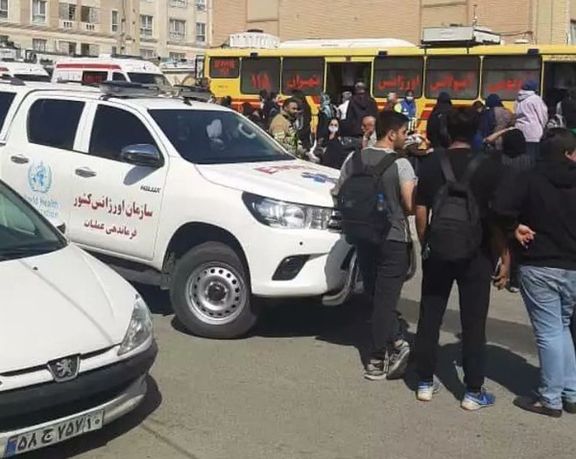
Amid a wave of chemical attacks on schoolgirls across Iran, several teachers' and students' unions have called for nationwide protests on Tuesday and Wednesday.
The Coordination Council of Iranian Teachers' Trade Associations issued a statement on Monday, demanding an “an end to biological repression and the threat to the lives of citizens, especially students."
The council urged a transparent and independent fact-finding mission comprised of civil, trade union and political activists along with a group of doctors and experts as well as human rights lawyers to thoroughly investigate the issue and publish the results to the public. The large scale of the attacks and number of affected students cast doubts on the regime’s argument that the assaults are the results of arbitrary actions by hardliners who are against girls’ education, read the statement.
The group had already issued statements about the March 7 gathering, calling on teachers and the people of Iran to stage rallies outside the parliament in Tehran and in front of the education department offices in other cities to demand action on school attacks.
Teachers are also distraught about their falling purchasing power amid a sharp decline of Iran’s currency and raging inflation. This will also be a part of their protest.
Describing the attacks as “bioterrorism,” the national teachers’ union also criticized the government for three months of denials. “There is strong suspicion that the purpose of the attacks is quashing the Woman, Life, Freedom movement by instilling fear among girls and their families,” the statement said while demanding Supreme Leader Ali Khamenei and other top religious figures to condemn the attacks expressly and decisively.
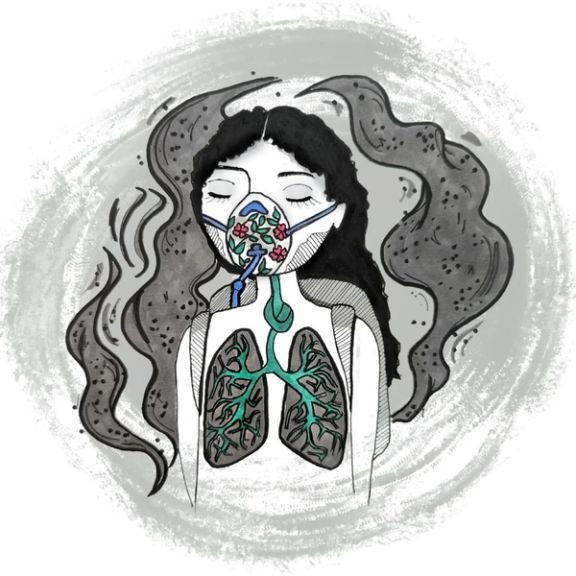
Several other groups, including the Council of Freethinking Students of Iran and provincial guilds for teachers, also called for demonstrations to condemn the regime’s reluctance to act about the mass poisonings. The Council of Freethinking Students said that the gas attacks is the continuation of the regime project to indoctrinate students that started by “the introduction of Taliban ideology and employment of 20,000 mullahs into the education system as teachers."
"The tragedy of poisoning students by the rusty brains of lying and hypocritical authoritarian rulers, is an attempt to take revenge for the women, life, freedom uprising," added their statement.
There are other calls for protests to mark International Women's Day on Wednesday, with imprisoned journalist and human rights activist Narges Mohammadi urging more "street protests in Iran" over the poisoning of schoolgirls. In a post on her Instagram page Mohammadi called for "immediate practical action by all international human rights organizations and the United Nations" regarding the serial poisoning of students, especially girls. "Let's stop the crime against our girls with widespread protests and street presence across the country," she addressed the people of Iran.
Also on Monday, Iran's ruler Ali Khamenei finally spoke about the poisoning of schoolgirls, describing it as an "unforgivable" crime and denying any government role in the attacks. "Authorities should seriously pursue the issue of students' poisoning. This is an unforgivable crime... the perpetrators of this crime should be severely punished," Khamenei said.
If the attacks cease to happen from now on, it shows that the perpetrators are followers of Khamenei, strengthening speculations that they were acting following his remarks about “small punishment of youngsters” who took to the streets for anti-regime protests.

Imprisoned journalist and human rights activist, Narges Mohammadi has called for more "street protests in Iran" over the poisoning of schoolgirls.
In a post on her Instagram page Mohammadi called for "immediate practical action by all international human rights organizations and the United Nations" regarding the serial poisoning of students, especially girls.
"Let's stop the crime against our girls with widespread protests and street presence across the country," she addressed the people of Iran.
Referring to the silence of the "tyrannical regime" on this issue, while it hastily takes judicial action against ordinary people during protests, she said the Islamic Republic "sends an important message to the Iranian society and the world with such behavior."
The Iranian civil activist further asked all international human rights organizations and the United Nations to "not ignore this anti-human and fearful move and take immediate practical action."
Mohammadi has been to jail several times over the past two decades. She was arrested and sentenced again to eight years in prison and 70 lashes by the Revolutionary Court on trumped-up political charges in a five-minute trial in January 2022.
Reports suggest more than 1,000 schoolchildren have been affected by poisonings since November. It remains unclear who is responsible for the attacks and exactly what chemicals were used. Reports now suggest schools across 21 of Iran’s 30 provinces have seen suspected cases, with girls’ schools the site of nearly all the incidents.
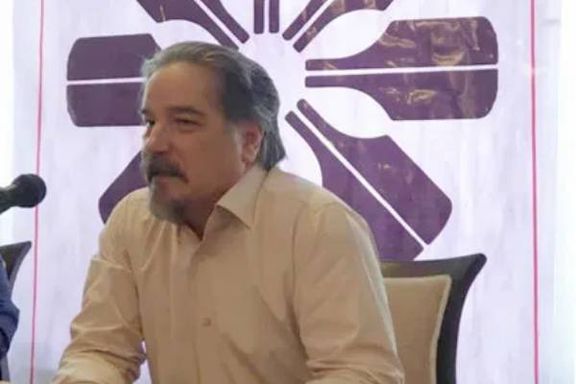
A prominent writer and member of the Writers' Association of Iran says his release was made possible by the power of the people's protest movement.
Reza Khandan Mahabadi, who was released in February after months of detention, wrote on his Facebook page Sunday that the Iranian regime’s suppression of protests added to people's griefs, but “it could not put the genie back into the bottle.”
“So the regime had to give in to the people's will to some extent and therefore the Islamic Republic opened the door of the prisons a little,” added Khandan.
“Although the victories of the movement are pleasant, they are not sufficient. There are still many political prisoners waiting for their trial while the arrests continue,” he went on to say.
Despite the release of some political prisoners, including Khandan and several other members of the Writers' Association, many political prisoners, including Keyvan Mohtadi are still behind bars.
During antigovernment protests at least 20,000 people were arrested and many still remain in prison. Four protesters were hanged in December and others face the death penalty.
Khandan, 62, was sentenced to six years in prison on charges of "propaganda against the establishment" and "complicity in acting against the security of the country" and his sentence came into effect at the beginning of October 2020.
He became a member of the Writers' Association of Iran in 1998 and has been a member of the board of directors of for five terms.
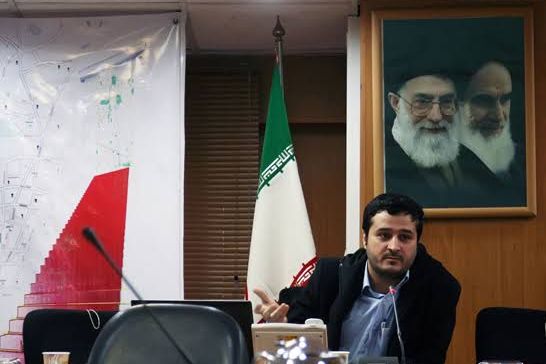
Iranian media say a journalist who had been following the news of gas attacks on girls’ schools in the religious city of Qom for the past few weeks, has been arrested.
Ali Pour-Tabatabaie, who is one of the administrators of Qom News website was reportedly detained on Sunday morning in Qom 120 kilometers south of Tehran.
According to local media, including Etemad Daily, there is still no information about which security or intelligence outfit arrested the journalist.
Milad Alavi, a reporter at Shargh, wrote in a tweet that Pour-Tabatabaie was arrested on Sunday morning but "called his sister at around 8 pm to let her know about his detention". However, due to the sudden disconnection of the phone he was unable to explain the reason for his arrest.
His arrest drew reactions of several journalists and activists in the country, including Abbas Abdi, a reformist commentator, who wrote on Twitter that the arrest of Pour-Tabatabaie "not only does not help to clear up the ambiguity about poisonings, but also makes it worse."
About 80 more schools were targeted by chemical attacks on Sunday with dozens of girls hospitalized.
The gas attacks, targeting girls' schools since November, intensified this week with hundreds more girls falling sick across Iran.
It is believed that the attacks are a coordinated effort to deter the young students from supporting ongoing unrest, triggered by the death of Mahsa Amini.
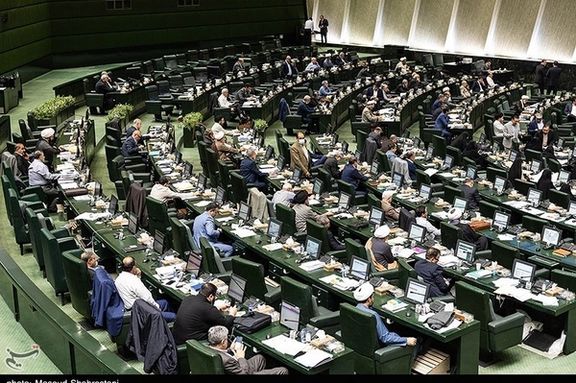
Iran's Parliament sunk into commotion Sunday as a lawmaker tried to stop another one from voicing his constituents’ anger over the so-called ‘chain’ school poisonings.
During a session for examining next year’s budget bill, Seyed Ghani Nazari, the representative of Khalkhal in northwestern Ardabil Province, used his time to speak about his constituents’ anger over the poisoning of schoolgirls in his district.
An ultra-hardliner member of the National Security and Foreign Policy Committee, Javad Karimi Ghodousi, who was standing behind Nazari, kept interrupting him while other lawmakers also shouted to drown his voice. Speaker Mohammad-Bagher Ghalibaf also intervened, asking Nazari to only speak about the budget bill.
“Mr Ghalibaf, what do you expect me to talk about when students were hospitalized in Khalkhal? It’s my duty to demand the government and responsible bodies to investigate. My phone has been ringing since morning and people are asking me to pursue the matter,” Nazari said as other lawmakers joined in the dispute, shouting and gathering around Nazari.
Ghodousi later alleged that those who speak about the poisoning incidents could be “adding fuel to the enemy’s fire”.
The parliament has established a working group to investigate the incidents of mysterious poisonous gas attacks on girls’ schools that have now spread to around 100 cities.
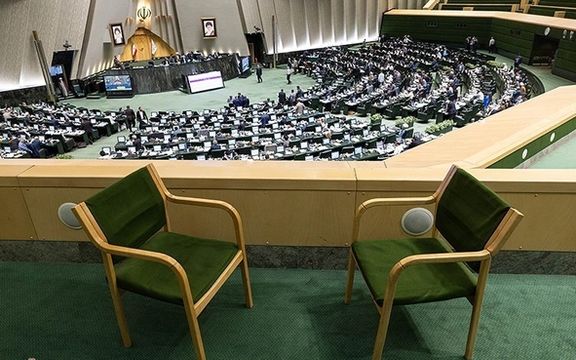
Poisoning of students was reported in at least 80 more schools across the country Sunday.
Hardliners and government officials are increasingly attributing the gas attacks to “students’ pranks” or “enemies of the Islamic Republic”.
Authorities have yet not offered any report on the incidents or on findings based on samples taken from over 1,500 students who have been hospitalized since the first incident took place in the religious city of Qom on November 30.
The ultra-hardliner Kayhan newspaper whose chief editor Hossein Shariatmadari is an appointee of the Supreme Leader Ali Khamenei on Saturday claimed that opposition groups such as the Mujahedin-e Khalq Organization (MEK) have been perpetrating the attacks on behalf of foreign enemies and casting the blame on religious groups in Iran or the government.
“It’s worthy of note that certain western governments and intelligence services have a long history of committing crimes and blaming others for them including the chemical attacks by their Sunni extremist mercenary groups in Syria for which they blamed the Syrian government. The CIA and Mossad have committed many acts of biological terror,” Kayhan wrote.
However, such claims are countered by citizens that how the ‘enemy’ is able to conduct such widespread attacks if the government has control over the country.
The IRGC-linked Fars News Agency on Sunday claimed that experts believe pranks by teenage students or “mass phobia” are the most likely explanations for the mysterious poisonings.
Given the highly synchronized nature of the attacks, many in Iran accuse the government of having a direct role in the poisoning of schoolgirls, as revenge for their rejection of the hijab and their active role in the Woman, Life, Freedom protests in the past few months. Even if some fundamentalist groups are behind the chemical attacks the government stands accused of covering up their crime.
“People from inside the system must be collaborating with the perpetrators,” wrote Abbas Akhoundi, a roads and urban development minister in Hassan Rouhani’s government, in Shargh newspaper Saturday.
Some medical experts such as Dr. Mohammadreza Hashemian, an official of Masih Daneshvari Hospital in Tehran where many of the victims have been treated, have pointed out that the gases suspected of being used by the attackers seem to be composed of various chemicals that are not accessible to ordinary people.